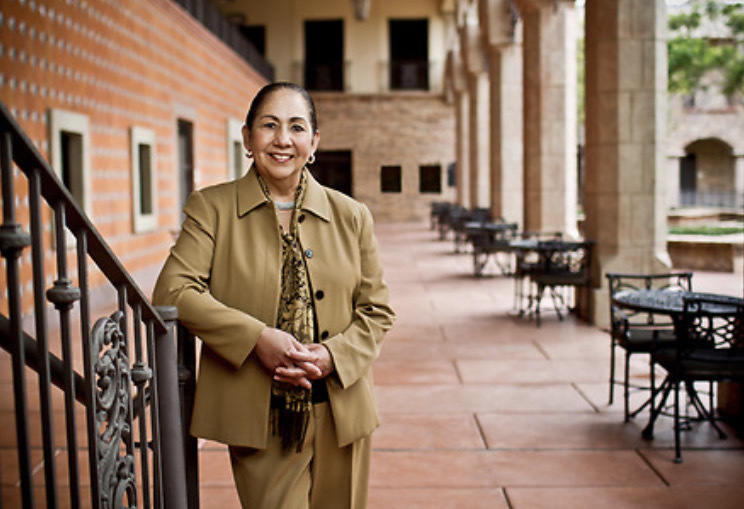UT alum Juliet García, Ph.D., receives Presidential Medal of Freedom
July 21, 2022
Editor’s note: This article first appeared in the July 19, 2022 flipbook.
After missing two phone calls from President Joe Biden, Juliet García, Ph.D., was rendered speechless upon receiving momentous news from the granddaughter of Cesar Chavez that she was invited to Washington, D.C., to receive the highest civilian honor.
On Friday, July 1, García — the first Mexican American in the country to be appointed president of a university and a Distinguished UT Alumnae — was one of 17 people awarded the Presidential Medal of Freedom. García said that she felt humbled and honored to be chosen to stand among a group of political activists and freedom fighters.
García was born and raised in Brownsville, Texas, a border city part of the larger Rio Grande Valley. García said higher education is not typically accessible for many Hispanic families in the Valley, but she said her father insisted that she and her two brothers attend college. However, García said despite facing many challenges and barriers in her path to success in academia, she never let anything intervene with her success. Instead, heeding her mother’s timeless advice, she said she chose to work harder.
“(My mother) always told (my siblings and me) that the road was going to be twice as hard for us,” García said. “She said, ‘It’s just the way it is. You’re young, you’re Latina and you’re female. You live in a world that doesn’t value being Hispanic, so you are just gonna have to work harder than anyone else. You have no choice. You just have to work harder, be better (and) be smarter.’ She saw the reality of the circumstances.”
García said early in her career, she was not aware she was pioneering a movement for Hispanic women around the country. When first appointed president of Texas Southmost College in 1986, she said she did not know she was the first Latina in the country to serve in that position.
Mary Rose Cardenas, a member of the Board of Trustees at Texas Southmost College that appointed García as president, said there were only two women on the board: herself and Jean Eckhoff. Cardenas said the two women fought hard to appoint García. With García being only 37 years old, Cardenas said she suspected the other board members only claimed to be concerned about her age when, in reality, they were more concerned with her gender and ethnicity. Reba Cardenas McNair, daughter of Mary Rose Cardenas, said after Texas Southmost College merged with the UT System, the pair of women also advocated for García to become president of UT-Brownsville.
“It was not easy to get (the board) to accept her, but we worked hard at it,” McNair said. “I’m very excited and proud of the opportunity. I will always remember her getting this award.”
Julieta Rico, García’s granddaughter and UT alumna, said growing up with García as a grandmother allowed her to see both the good and the bad of García’s career — all the hardship that came alongside the success. Rico said that García warned her that accomplishing her dreams would be difficult and full of obstacles, but she shouldn’t let those trials and tribulations prevent her success. Those teachings, Rico said, led to a household that treated her and her sister as equals and never questioned her desire to go to graduate school, instead encouraging her hunger for learning.
“(García) told us that education is the most important thing because (people) can take away your riches, your land, your money, anything, but they can never take away the knowledge you gain from education,” Rico said.
Nationwide honors and awards are not the only things García is known for. In 2002, the city of Brownsville, Texas, established a middle school in her name. García said that most people have to go to bigger cities to make a difference, but she had the honor and privilege of achieving this in her hometown. She said her mother always told her that she should use her gifts and prominence to change things for the better.
“If you get (a prize or award), you better do something responsible with it,” García said. “You better use that new power or new position … to create something important and help others walk through that door as well. I have always felt that sense of responsibility and privilege.”
García said that growing up surrounded by her brothers and father prepared her to claw her way into the white, male-dominated spaces she frequently found herself in as a successful, career-driven woman in academia. She said although there was pressure to conform, she stayed true to herself, and her passion, work ethic and drive carried her to where and who she is today: a recipient of the Presidential Medal of Freedom.
“It was somebody else’s problem that they didn’t see me fit the mold,” García said. “I never imagined that I had to become like them in order to do what I love to do. There was no way (I) was going to be kept from fulfilling (my) destiny.”











